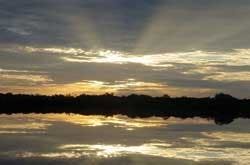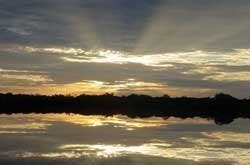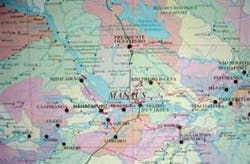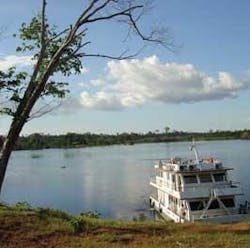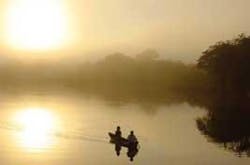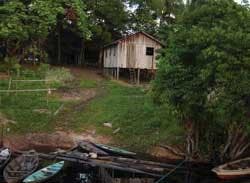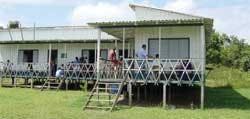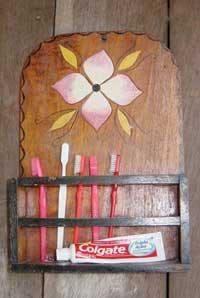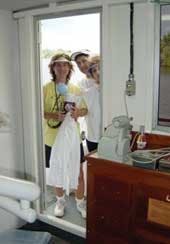A laborious birthday gift to the Amazon proves to be, well, ‘amazing!’
Hygienist boards dental missionary cruise to rural Amazon villages.
How would you feel about volunteering your dental skills to the river people of the Amazon? That was my birthday present to myself in July 2004. I was invited to accompany Erica and Cesar Migliorati, fellow instructors at Nova Southeastern University in Florida, on a medical-dental mission. One reaction was to question my sanity. But I have always wanted to use my skills to help others - that seems to be a hygienist’s nature. Upon graduation, I had wanted to join the Peace Corps, but my looming college loans persuaded me otherwise. So off to work I went - for the next 30 years!
I must admit that I was highly influenced by one of the doctors that I teach with at Nova, who does volunteer work all over the world. The awe that I felt from his adventures tantalized me. If others could do it, and it influenced them so profoundly, then why couldn’t I?
So to the amazement of my husband, my patients, and myself, I made the commitment to go. I then received six shots and three medications to protect me against lovely diseases such malaria, spinal meningitis, hepatitis A and B, dengue fever, and polio (yes, polio is making a resurgence in underdeveloped countries).
The director of the Amazon mission instructed us to bring two bags of luggage: one for our personal belongings and one full of items to give to the natives. That really appealed to my altruistic nature. I purchased and collected lots of goodies from my patients, the dollar store, and my co-workers and filled my giveaway bag. One of the greatest highlights of my trip was seeing the delighted faces of the villagers as we handed them our donations. Imagine seeing a child’s eyes light up after giving them a stuffed animal - something they had never had before!
We started our adventure in Brazil, treating villagers along the Amazon River. We joined a group from Orlando, Fla. Among them was Jane Kochler, a fellow hygienist.
The four dental personnel operated in two divisions. One division worked as a triage, deciding which lucky Indians would receive treatment from the two professionals on the boat. The first division also performed the vital function of education! During the trip, we gave out 450 toothbrushes and tubes of toothpaste. We taught them how to brush, when to brush, and that they could now use their very own toothbrush without sharing it with the rest of their family! Through this education, we perhaps made a small dent in the rampant decay that we found.
The other two dental teammates worked feverishly to treat as many people as possible. We started out with composites on the anterior teeth, but then began to see bombed out molars. How heartbreaking it was to extract permanent first molars on children. Why did children who had no exposure to fast food, soda, snacks, etc., have such rampant decay?
We soon discovered the reason - they slathered honey on everything! Amazingly, the bees did not even sting them as they extracted the honey from the hives. And what delicious honey it was - no preservatives or additives - just sweet and natural. Honestly, I probably would have put that honey on everything, too, if it weren’t for the wonderful concept of knowledge! So, hopefully, we gave the children hope that by brushing their teeth daily, and diminishing the effects of all that honey, they could grow up and not be like their nearly edentulous parents.
The boat on which we traveled along the Amazon River provided us with food, bathrooms, drippy showers, and blessed air conditioning. Even the little dental operatory was air conditioned. Additionally, there was an autoclave, microscope, lab testing equipment, and a small room for minor operations.
Beyond the equipment, the boat contained just a group of people with a wonderful spirit and a common goal. Never before have I met people with such different backgrounds and languages, who were so willing to share their stories and to give up the creature comforts of home, to try to help people that they didn’t even know. I felt an instant camaraderie with all of them. If our small group could accomplish so much in terms of interpersonal relationships, and also accomplish our goal of administering dentistry, what would happen if even more people volunteered?
I must tell you about the last village that we visited. The children were lined up waiting for us to help them. We only had four hours to work, because we had to start our 18-hour boat ride back to civilization. While we were working on a child, Erica Migliorati came into our operatory and emotionally pleaded with us to see a special boy. Cesar explained that, unfortunately, we couldn’t due to time constraints.
“But you must!” begged Erica. Then Erica decided to move him in front of the previously selected patients. In comes a beautiful nine-year-old boy with two swollen cheeks - two abscesses. As we removed the two infected teeth, which were decayed to the roots, this boy never flinched, grunted, or showed emotion. He must have been in so much pain previously that even the palatal injection elicited no reaction. Then Erica took him to the “pharmacy” where malaria medicines, antibiotics, diabetes, medications, and such were dispensed. About to give this boy antibiotics, Erica asked him when he last ate. “Yesterday,” was his reply. Knowing vomiting would ensue if the pills were taken on an empty stomach, Erica begged the cook to make this child something to eat. After he gratefully ate the meal, antibiotics were dispensed to him, and he disappeared. Upon leaving, the villagers were crying for us to stay and treat them. Our hearts were breaking as our boat pulled away.
How did we feel as we motored back to civilization? I felt we had done so little compared to the actual need. Jonathas Moreira, the director of our mission, put things into perspective for all of us. Even though we visited a small fraction of the 7,000 communities in need, the 200 families that we assisted will tell others of the good treatment the Americans and their medical boat delivered. Hopefully, they will spread the new hygiene information that they learned. He also said that, without the Americans, this work would not be possible. Even though we did not speak the language, our smiles were readily translated!
Nova plans to send students next year. Wouldn’t it be wonderful if we had more experienced hands and hearts that could change the lives of even more Indians, and in turn, change our own.
As an ironic aside, you won’t believe what happened to me 18 hours into the Amazon trip. I developed a toothache! I couldn’t believe it! I knew my molar needed a root canal, and it hurt! I was about to complain, then I thought of that precious nine-year-old boy. How could I dare complain after witnessing the bravery of that child? There was one huge difference between us. I was lucky enough to get my tooth fixed, not extracted! That puts everything into perspective, doesn’t it?
Wow, what an amazing adventure!
Ronny Charin, RDH, BS, graduated from Fairleigh Dickinson University and worked as a member of the faculty of the same university in the dental hygiene program. She has been in private practice since 1967, and also is currently adjunct clinical instructor at Nova Southeastern University College of Dental Medicine. She specializes in the fields of advanced periodontal therapy and anxiety reduction. Contact Mrs. Charin at (954) 473-1526 or [email protected].
